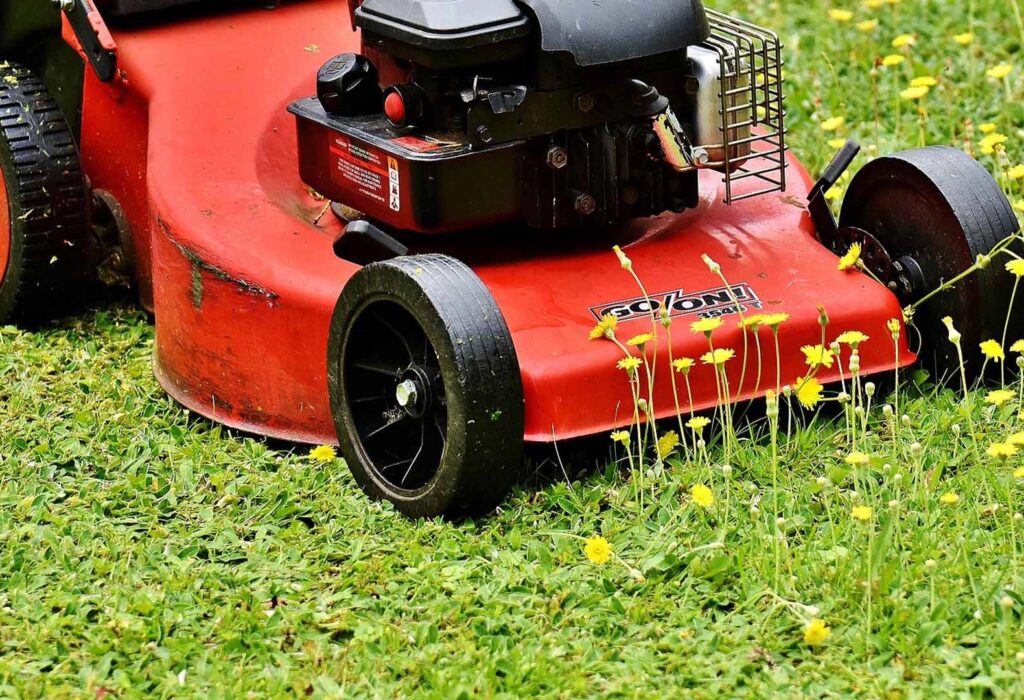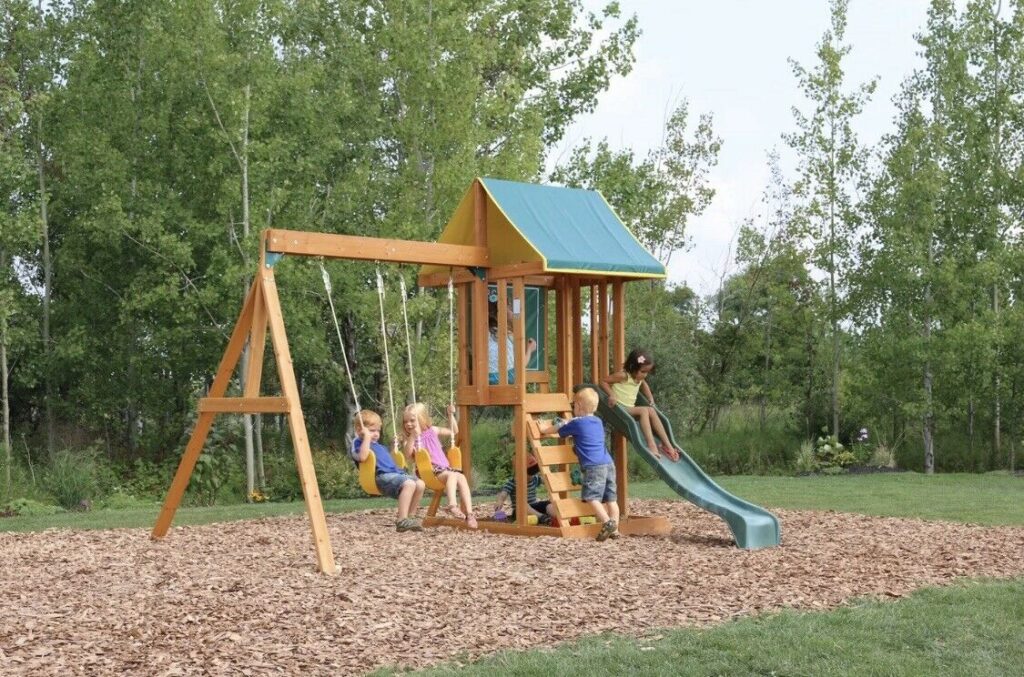An unkempt backyard says a lot about you. It can make your house look uninviting and give off the impression that you don’t care about your home. And with so many tasks on your plate, kids, and work, it can be difficult to find the time to keep up with your lawn. This is where a good fertilizer spreader comes in handy.
We’ve tested 19 models and compiled a list of the 5 best fertilizer spreaders with the Lesco 101186 being our top pick. All products on the list are made of stainless steel or steel materials. There are fertilizer spreaders with 40 lbs hopper capacity for those who have medium or large yards and 150 lbs capacity for professionals or those with a golf course. The products on our list have a great weight distribution, so you can easily push them without feeling like the spreader is too heavy.
More features: manual deflector kit included, stainless steel frame, adjustable handles, cam operated
We like the stainless steel frame on the Lesco 101186 because it means durability, easy maintenance, and a rust-free appearance over the years, even with regular outdoor use. The spreader’s oversized tires roll with ease and ensure stability no matter how rough the terrain may be, and you never have to worry that the spreader will tip over. The gear set is fully enclosed to protect it from debris and rust, so you can be sure of its longevity.
The large hopper, with a capacity of 80 lbs, provides ample supply of product and minimizes the number of times you have to refill the container. For someone with a medium to large lawn, this can be time-saving. To ensure you get even spreading, Lesco uses a 5:1 gear ratio which provides uniform product distribution, and a manual deflector kit to prevent the product from spreading outside of the desired area, easily making it the best lawn fertilizer spreader currently on sale. The dispensing mechanism uses a cam-operated oscillating agitator to enhance product flow and preserve the product coating.
The handles adjust to 3 positions, so different users can adjust accordingly to match their height.
The spreader weighs 42 lbs when empty, which leans on the heavy side. Given that it’s designed to be a heavy-duty fertilizer spreader, however, this shouldn’t come as a surprise, neither should it be a problem since you won’t need to lift it at any time.
More features: auto-stop dual impeller, 14’’ pneumatic tires, adjustable steel frame
A test drive of the Chapin International 8620B makes it clear why most farm care enthusiasts consider this spreader to be the best farm fertilizer spreader. The heavy, powder-coated steel frame tells of a sturdy machine built for the outdoors. Its heavy-duty, wide tread 14″ pneumatic tires provide the traction and stability needed to move in all kinds of terrain.
With its large-capacity 150-lb hopper, it’s the best commercial/professional fertilizer spreader you can get at its price point. Add in the 11 gate adjustment incremental settings that give you a wide range of width settings for accurate spreading and it’ll be hard to get a better fertilizer spreader in its class. To tow the fertilizer spreader from one place to another without dispensing product, set the gate adjustment to zero. This will keep the opening closed until you reset the gate setting.
The spreader uses a dual impeller mechanism that is designed to only allow the product to pass through when the spreader is in motion. As soon as you stop the spreader, the auto-stop mechanism kicks in. This translates to less work for you and zero product wastage.
It comes with a heavy-duty trailer hitch that makes it easy to attach to a lawn tractor or other vehicle for large area and professional use.
It comes with an unbeatable lifetime limited warranty.
More features: polyethylene hopper, stainless steel frame, waterproof harness connectors, 4 blades
The 150-lb-capacity JRCO Electric Broadcast Spreader 503 uses a heavy duty, direct drive, 12V electric motor that is sealed for longevity, with a stainless steel bumper added to further protect the motor and fan. The motor is connected to a sealed wire harness that hooks up to the battery of the mower or utility vehicle on which you’ve hitched the spreader. It is designed to attach to mid-mount utility vehicles and requires the JRCO mounting bar to do so. Unfortunately, JRCO doesn’t include the bar when you buy the fertilizer spreader, so you have to buy it separately.
It has a foot-operated stainless steel gate that allows for hands-free operation of zero-turn mowers/utility vehicles. The non-gumming design of the gate ensures easy opening and tight closure. Electronic speed control ensures feeding uniformity and keeps the spread pattern widths between 5′ and 24′.
This spreader features a stainless steel frame and engineered plastics in the non-sensitive parts. Given its sturdy construction and choice of material, it will last a good number of years and remain corrosion free throughout its lifespan.
It comes with an array of optional features, including a lump-sifting screen, side deflector kit, and an extension wire harness to mount the speed control near you for effortless adjustment.
For a spreader whose price tag is above the $1,000 mark, it has an overly short warranty – only 90 days.
More features: heavy duty frame, precision rate dial, edge guard
The first thing you notice in the Scotts Turf Builder Classic Drop Spreader is how big the hopper is. Scotts says the hopper can spread up to 10,000 square feet with fertilizer, which is approximately 32 lbs, making it perfect for medium-sized gardens as it eliminates the need to constantly refill the product. The spreader uses a 22-inch spread pattern for maximum coverage so that you make fewer passes and turns when operating it.
Complementing the precise drop spreader mechanism is a patented Scotts EdgeGuard which blocks the right side of the spreader pattern, restricting the product application to the desired areas only and ensuring the product doesn’t fall on waterways, sidewalks, and similar grounds. To turn on the EdgeGuard, slide the lever to the ON position.
The sturdily-built, heavy-duty frame in this spreader is designed to withstand harsh outdoor conditions and provide years of reliable use. However, the wheels can feel wobbly, especially in uneven terrain. Given the size of hopper they support, they’re rather narrow and don’t hold the weight very well.
If you do not enjoy assembling products, you’ll appreciate that this spreader comes assembled and pre-calibrated. All you’re required to do is tighten the wing nuts. To do so, raise the top half of the handle and proceed to tighten the nuts by hand. You don’t have to worry about fixing something incorrectly or trying to figure out what some of the not-so-clear instructions in the manual mean.
More features: powder coated chassis, dual port shut off
The greatest advantage in using the handheld Earthway Products 199435 Earthway 3100 Professional fertilizer spreader is that you can use it on any ground, including terrain where it’s challenging to maneuver a wheeled spreader. The crank-operated design makes it easy to use, and a combination of rollers and spreaders works to give you even spreading. It relies on a powder-coated chassis and heavy-duty gearbox to keep the hand crank moving, and uses an adjuster lever to control the spreading rate.
The spreader has a 40-lb hopper, which is perfect for small and medium-sized lawns and gardens. At only 9.7 lbs, you hardly notice the spreader’s weight. You need to hike it up your chest and slip your hands through the shoulder straps, a position that gives you great control and maneuverability. However, the shoulder straps feel thin and somewhat cheap. You may want to get them reinforced if they bother you.
The only unfavorable thing about this model of fertilizer spreader is that your face, hands, and lower body will be exposed to whatever product you’ll be feeding. So it’s advisable to have your full protective gear on, especially when spreading chemicals.
To give you full control over the feeding, Earthway Products includes a dual port shutoff and an additional shutoff setting control, fittingly situated on the handle.
Also included is a heavy-duty rain cover that protects the hopper and spreader in wet weather.
Now that you’ve seen a few fertilizer spreaders worth buying, let’s take a deeper look at the uses, benefits, and care of fertilizer spreaders, and how to choose the best one for your garden/yard.
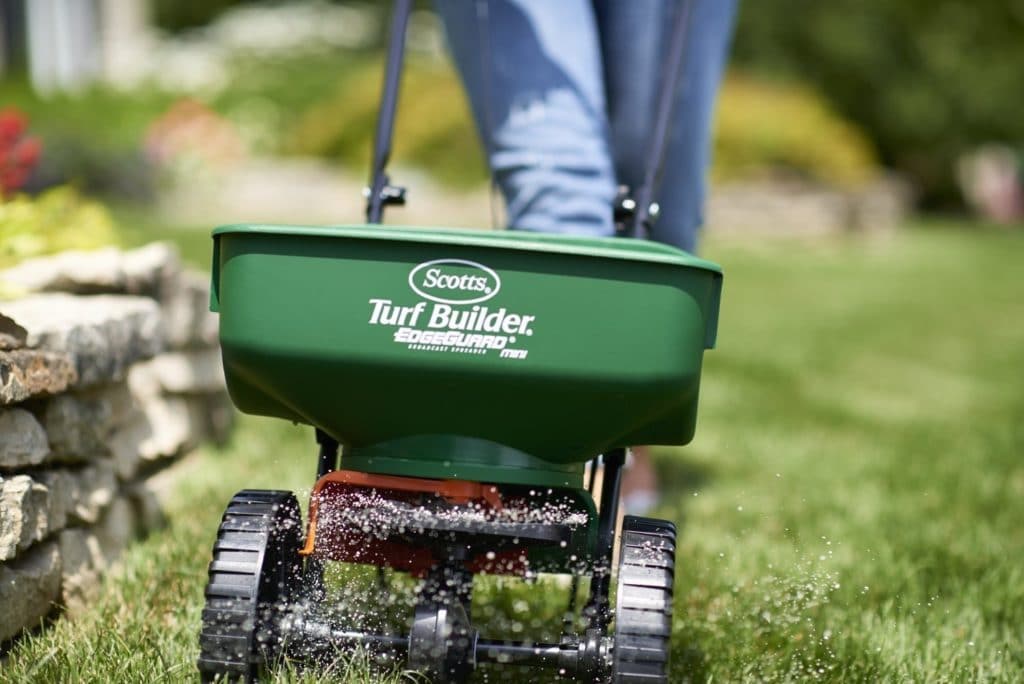
It is multipurpose, meaning you can use it to distribute all kinds of lawn products, from seeds and fertilizer to soil builder, compost, and weed killers.
It ensures that the product is evenly distributed across the lawn or garden.
It can help you improve and maintain the health of your garden/lawn.
It helps promote precision gardening, ensures that you use the right amount of
product on the garden/yard, and eliminates product wastage.
Handheld spreader – A small, crank-operated spreader that puts you in full control of where the product falls. They are ideal for small gardens and yards and all those hard-to-reach corners.
Push/walk-behind spreader – As the name implies, you push the spreader and walk behind it. This type is designed in such a way that as the wheels rotate, they engage the dispensing mechanism, which then distributes the product. The effectiveness of the spreader is determined by how well you cover the ground, so you must be careful to guide the spreader around the entire lawn/garden and ensure that you don’t unintentionally overlook any patches.
Tow behind spreader – This large-capacity spreader uses the same distributing mechanism as the walk-behind spreader, where the wheels engage the dispenser, but it’s attached to an all-terrain vehicle or riding mower.
Broadcast spreader – A wheeled model that is designed to spread product over large areas. Depending on the build, it can be pushed forward, pulled in a retreating fashion, or attached to a lawn tractor or all-terrain vehicle.
Drop spreader – This model is designed to distribute product at a specific width, which typically is a specified distance between the wheels. They are ideal for small to medium-sized yards and are efficient in gardens/lawns with planting beds. Spreading is highly precise and you’re in control of where the product falls, but you have to be careful not to leave gaps in between passes.
There are plenty of affordable fertilizer spreaders in the $50-$150 price range. These come in all types, from hand-held to tow behind, and drop spreaders. In the mid-price range, we have spreaders averaging $150-$300. High-end models cost anything between $500 and $1,000 or more. Beyond just evaluating a spreader’s price, you should also consider its design and capacity, among other features. While most high-cost spreaders tend to deliver value, some low-priced spreaders with excellent features do a remarkable spreading job too.
Let’s now look at the specific features that matter when choosing a fertilizer spreader and how to choose a spreader by taking into consideration the available features.
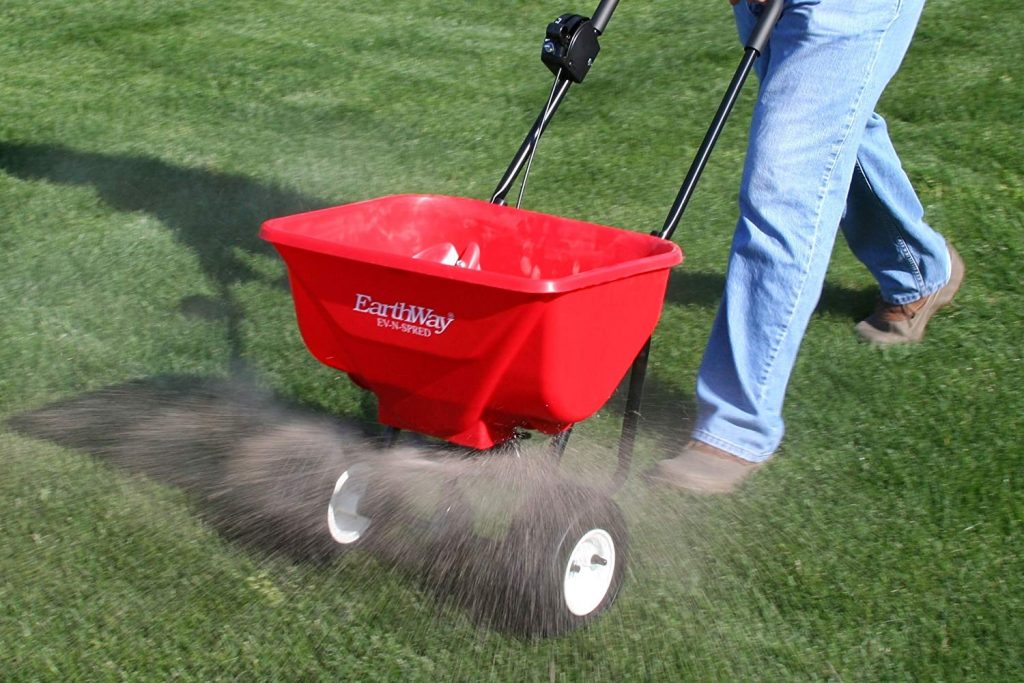
Choose a spreader that’s made from strong, durable materials. Stainless steel and steel – as in the Lesco 101186, JRCO Electric Broadcast Spreader 503 and Chapin International 8620B – are top choices because of their hardwearing nature. Remember the spreader will be exclusively used outdoors, so choose a material that weathers the elements well. Stainless steel is an excellent choice in this regard. If going for steel, check that it is treated for corrosion and rust protection. Regular maintenance will keep it in top condition over the years. If the frame is largely made of plastic, there’s the possibility of wearing out over time, especially when frequently used in the summer. Some engineered plastics are quite durable and can withstand the elements, including extreme weather conditions.
How much product can the hopper hold? A big hopper means infrequent refills, which is what you want when distributing product across a large area. If you’re only spreading the product in a small lawn, you can settle for a small hopper. A hopper that can hold 30-50 lbs of product is sufficient for small and medium-sized lawns. For larger or commercial settings, go for a hopper with a capacity of 120+ lbs, such as the Chapin International 8620B or JRCO Electric Broadcast Spreader 503.
This has a lot to do with the materials used in constructing the spreader, but it’s also partly determined by the quality of workmanship. If you’re spending upwards of $100 on a spreader, choose a model that is solidly-constructed and made from strong materials. The best of these should last for more than 10 years. Good examples are Lesco 101186, Chapin International 8620B, and JRCO Electric Broadcast Spreader 503.
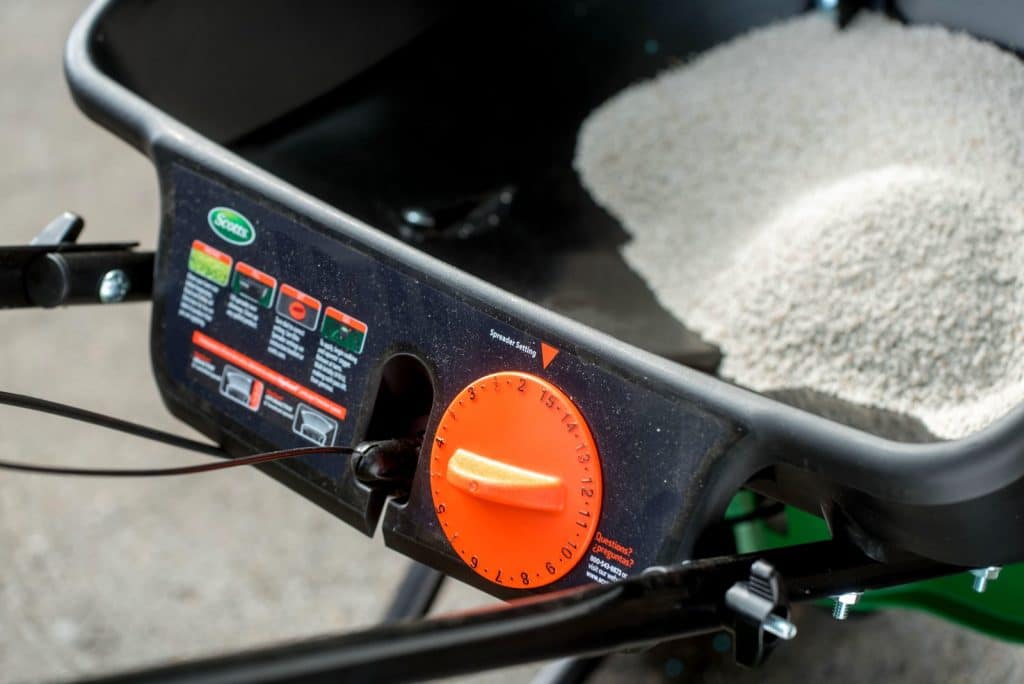
The wheels of a spreader play an important role in that they are tasked with supporting the main body of the spreader. If the wheels are poorly designed, it means they can only offer a weak level of support. For excellent support and stability, choose a spreader with wide, well-balanced tires. Spreaders like Chapin International 8620B have pneumatic tires for improved traction and stability. The oversized tires in the Lesco 101186 are another example of well-designed wheels.
You don’t need many accessories to improve the user-friendliness of a spreader. One accessory that is widely acknowledged, however, is a hopper cover. A good cover like the Lesco Hopper Cover 092128 protects the material that’s inside the hopper from humidity, rain, snow, and other moisture forms, hence preserving the product quality. It also keeps fertilizer dust and chemical particles inside the hopper, protecting you from chemical dust inhalation and skin contact with chemical compounds.
The best fertilizer spreader warranties cover 5-years. We’re talking of models like Earthway Products 199435. But we also have exceptional ones like Chapin International 8620B, which comes with a lifetime limited warranty. Most have a 1-year warranty term, with a small number covering you for as little as 3 months. JRCO Electric Broadcast Spreader 503 is an example of such. If you’re spending a considerable amount of money on a spreader, as you are doing on the JRCO, choose a product with a longer warranty term so you can get your money’s worth in manufacturer support.
Load the spreader on open ground, preferably on the sidewalk or driveway. You want to be able to sweep up any spills and apply on the garden/yard. Loading on the sidewalk also eliminates any likelihood that hard-to-pick spills will fall in a concentrated mess on the garden soil.
Follow the manufacturer’s instructions for calibration, distribution rate, and distribution pattern.
Maintain a steady, even pace when moving the spreader to ensure uniform distribution of the product.
When you stop or make a turn, close the spreader opening to stop the dispensing mechanism from dropping the product on the spot.
Empty any product leftovers from the hopper before thoroughly washing the hopper (preferably using a water hose). Let it dry completely, oil the movable parts, and store in a dry place.
Our top choice of fertilizer spreader is the Lesco 101186, whose large capacity hopper makes it perfect for product feeding on large areas. And with the manual deflector kit, it keeps the product exactly where you want it. We like the hard-wearing and corrosion-resistant stainless steel construction, which makes it fully optimized for outdoor use. We also like the oversized tires which enhance its stability and improve maneuverability in rough terrain.
Our second favorite spreader is the Chapin International 8620B, whose hardy steel construction and wide pneumatic tires appealed to us. We also appreciate the large-capacity hopper, the 11-point gate adjustment, and the auto-stop dual impeller mechanism.
Rounding up this short list, and our third-best fertilizer spreader, is the Scotts Turf Builder Classic Drop Spreader. With a hopper that has a 10,000 square foot-capacity and a 22-inch spread pattern, this spreader is suited for medium-sized yards and delivers maximum coverage with every pass. We like the sturdy frame and the EdgeGuard, which prevents product from falling onto undesired places.




